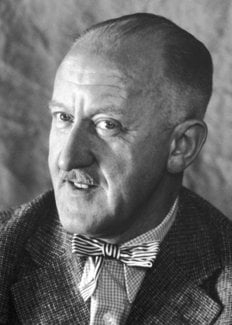Halldór Laxness
Biographical

Halldór Kiljan Laxness was born in 1902 in Reykjavik, the capital of Iceland, but spent his youth in the country. From the age of seventeen on, he travelled and lived abroad, chiefly on the European continent. He was influenced by expressionism and other modern currents in Germany and France. In the mid-twenties he was converted to Catholicism; his spiritual experiences are reflected in several books of an autobiographical nature, chiefly Undir Helgahnúk (Under the Holy Mountain), 1924. In 1927, he published his first important novel, Vefarinn mikli frá Kasmír (The Great Weaver from Kashmir). Laxness’s religious period did not last long; during a visit to America he became attracted to socialism. Alþydubókin (The Book of the People), 1929, is evidence of a change toward a socialist outlook. In 1930, Laxness settled in Iceland.
Laxness’s main achievement consists of three novel cycles written during the thirties, dealing with the people of Iceland. Þú vínviður hreini, 1931, and Fuglinn í fjörunni, 1932, (both translated as Salka Valka), tell the story of a poor fisher girl; Sjálfstætt fólk (Independent People), 1934-35, treats the fortunes of small farmers, whereas the tetralogy Ljós heimsins (The Light of the World), 1937-40, has as its hero an Icelandic folk poet. Laxness’s later works are frequently historical and influenced by the saga tradition: Íslandsklukkan (The Bell of Iceland), 1943-46, Gerpla (The Happy Warriors), 1952, and Paradísarheimt (Paradise Reclaimed), 1960. Laxness is also the author of the topical and sharply polemical Atómstöðin (The Atom Station), 1948.
This autobiography/biography was written at the time of the award and first published in the book series Les Prix Nobel. It was later edited and republished in Nobel Lectures. To cite this document, always state the source as shown above.
Halldór Kiljan Laxness died on February 8, 1998.
Nobel Prizes and laureates
Six prizes were awarded for achievements that have conferred the greatest benefit to humankind. The 12 laureates' work and discoveries range from proteins' structures and machine learning to fighting for a world free of nuclear weapons.
See them all presented here.
